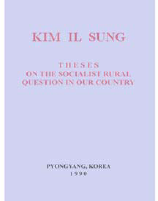 Cover page of the English-language edition (1990) | |
| Author | Kim Il Sung |
|---|---|
| Language | Korean |
| Subject |
|
| Published | 1964 (Korean ed.) |
| Publisher | Pyongyang: Workers' Party of Korea Publishing House (Korean ed.) Pyongyang: Foreign Languages Publishing House (English ed.) |
| Publication place | North Korea |
| Pages | 64 (English ed.) |
| OCLC | 150935485 |
| 309.2/63/09519 | |
| LC Class | HN730.6.A8 K513 1964 |
| Theses on the Socialist Rural Question in Our Country | |
| Chosŏn'gŭl | 우리나라사회주의농촌문제에관한 테제 |
|---|---|
| Hancha | 우리나라社會主義農村問題에關한 테제 |
| Revised Romanization | Uri nara sahoejuui nongchon munjee gwanhan teje |
| McCune–Reischauer | Uri nara sahoejuŭi nongch'on munje e kwanhan t'eje |
The peasant and agricultural questions will be solved finally only when the differences between town and country and the class distinction between the working class and the peasantry are abolished.
It is the sublime mission of the communists and the working class to achieve the final solution of the rural question and to lead the peasants to a communist society.
After the triumph of the socialist system, the Marxist-Leninist party should concentrate its efforts on the solution of the rural question in order to carry the revolution forward to final completion, in order to protect the interests of the entire working people thoroughly.
Theses on the Socialist Rural Question in Our Country[1]
Theses on the Socialist Rural Question in Our Country, also known as the Rural Theses[2] or Theses on the Socialist Agrarian Question in Our Country,[3] is a 1964 treatise by Kim Il Sung, the first leader of North Korea. The work lays out the most influential statement[according to whom?] on North Korean agricultural policy and its implementation transformed the country's agriculture from a traditional into a modern one.[citation needed] Crop yields were increased,[citation needed] but some environmental problems like deforestation ensued.[citation needed]
The Theses set out an application of Kim Il Sung's Three Revolutions Movement on agriculture. The three revolutions are: ideological, cultural and technological advancements in the agricultural field. The piece has become iconic [according to whom?] and has been referred to in other important texts including the leaders' works.[citation needed]
- ^ Kim 1984, p. 167.
- ^ Winstanley-Chesters 2014, p. xiv.
- ^ Josephson 2009, p. 143.